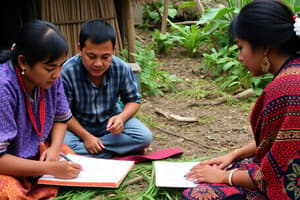Podcast
Questions and Answers
According to L.T. Smith, what is the primary goal of critical politics of interpretation in research?
According to L.T. Smith, what is the primary goal of critical politics of interpretation in research?
- To ensure that research is done on, for, or with indigenous peoples (correct)
- To reject antifoundational epistemologies
- To apply critical theory to indigenous research
- To predict the outcome of a struggle in advance
What is a key principle of indigenous research aligned with critical theory?
What is a key principle of indigenous research aligned with critical theory?
- Emphasizing the predictability of struggle outcomes
- Focusing on performative issues of social justice (correct)
- Rejecting community and critique
- Prioritizing positivist epistemologies
What is the consequence of not considering the eight questions posed by L.T. Smith?
What is the consequence of not considering the eight questions posed by L.T. Smith?
- Research will be faster and cheaper
- Research will be more accurate
- Research will be more objective
- Research may not benefit indigenous peoples (correct)
What is a characteristic of struggles, according to L.T. Smith?
What is a characteristic of struggles, according to L.T. Smith?
What is a key aspect of research ethics for Māori and other indigenous communities?
What is a key aspect of research ethics for Māori and other indigenous communities?
What is a commonality between indigenous research and critical theory?
What is a commonality between indigenous research and critical theory?
Who should conduct research about indigenous peoples, according to L.T. Smith?
Who should conduct research about indigenous peoples, according to L.T. Smith?
According to L.T. Smith, what is expected of researchers working with Māori?
According to L.T. Smith, what is expected of researchers working with Māori?
What is the purpose of L.T. Smith's eight questions?
What is the purpose of L.T. Smith's eight questions?
What is envisioned for future human subject research practices?
What is envisioned for future human subject research practices?
What is a key feature of both indigenous research and critical theory?
What is a key feature of both indigenous research and critical theory?
What do indigenous ethical and moral models call into question?
What do indigenous ethical and moral models call into question?
What is emphasized in a collaborative social science research model?
What is emphasized in a collaborative social science research model?
What are the values stressed in a collaborative social science research model?
What are the values stressed in a collaborative social science research model?
What is the goal of a collaborative social science research model?
What is the goal of a collaborative social science research model?
What is the desired outcome of turning the tables on the neocolonizer?
What is the desired outcome of turning the tables on the neocolonizer?
What is the result of Western scientists' practices of discovering, extracting, appropriating, commodifying, and distributing knowledge about the indigenous other?
What is the result of Western scientists' practices of discovering, extracting, appropriating, commodifying, and distributing knowledge about the indigenous other?
What is the main challenge of the decolonization project?
What is the main challenge of the decolonization project?
What is the limitation of critical, interpretive performance theory and critical race theory in indigenous settings?
What is the limitation of critical, interpretive performance theory and critical race theory in indigenous settings?
What is the problem with using critical theory's criteria for self-determination and empowerment in indigenous settings?
What is the problem with using critical theory's criteria for self-determination and empowerment in indigenous settings?
What is the limitation of using categories of race, gender, and racialized identities in indigenous settings?
What is the limitation of using categories of race, gender, and racialized identities in indigenous settings?
What is required for critical theory to be effective in indigenous settings?
What is required for critical theory to be effective in indigenous settings?
What is the result of Western scientists' practices of discovering, extracting, appropriating, commodifying, and distributing knowledge about the indigenous other, according to Linda Smith?
What is the result of Western scientists' practices of discovering, extracting, appropriating, commodifying, and distributing knowledge about the indigenous other, according to Linda Smith?
Who are the scholars who make it clear that critical, interpretive performance theory and critical race theory, without modification, will not work within indigenous settings?
Who are the scholars who make it clear that critical, interpretive performance theory and critical race theory, without modification, will not work within indigenous settings?
Who wrote the book 'Pedagogy of Freedom: Ethics, Democracy, and Civic Courage'?
Who wrote the book 'Pedagogy of Freedom: Ethics, Democracy, and Civic Courage'?
In which year was W.E.B. Du Bois' book 'The Problem of the 20th Century is the Problem of the Color Line' originally published?
In which year was W.E.B. Du Bois' book 'The Problem of the 20th Century is the Problem of the Color Line' originally published?
Which methodology involves collaboration and participation from all stakeholders, including those being researched?
Which methodology involves collaboration and participation from all stakeholders, including those being researched?
Who wrote the chapter 'Why Doesn't This Feel Empowering?'?
Who wrote the chapter 'Why Doesn't This Feel Empowering?'?
What is the title of the handbook edited by N.K. Denzin and Y.S. Lincoln?
What is the title of the handbook edited by N.K. Denzin and Y.S. Lincoln?
Which of the following is NOT a methodology?
Which of the following is NOT a methodology?
Who co-authored the chapter 'Rethinking Critical Pedagogy and the Gramscian Legacy'?
Who co-authored the chapter 'Rethinking Critical Pedagogy and the Gramscian Legacy'?
In which city was the book 'After Race: Racism after Multiculturalism' published?
In which city was the book 'After Race: Racism after Multiculturalism' published?
What is the central crisis in the world today, according to Native Canadian, Hawaiian, Māori, and American Indian pedagogy?
What is the central crisis in the world today, according to Native Canadian, Hawaiian, Māori, and American Indian pedagogy?
What is the significance of the concept of spirituality in Māori discourse, according to Linda Tuhiwai Smith?
What is the significance of the concept of spirituality in Māori discourse, according to Linda Tuhiwai Smith?
What is the essence of a person, according to Māori pedagogy?
What is the essence of a person, according to Māori pedagogy?
What is the function of a respectful performance pedagogy?
What is the function of a respectful performance pedagogy?
What is the outcome of the West's attempts to understand and control indigenous spirituality, according to Linda Tuhiwai Smith?
What is the outcome of the West's attempts to understand and control indigenous spirituality, according to Linda Tuhiwai Smith?
What is the relationship between human beings and the rest of nature, according to Native Canadian, Hawaiian, Māori, and American Indian pedagogy?
What is the relationship between human beings and the rest of nature, according to Native Canadian, Hawaiian, Māori, and American Indian pedagogy?
What is the significance of place, land, and landscape in Māori discourse, according to Linda Tuhiwai Smith?
What is the significance of place, land, and landscape in Māori discourse, according to Linda Tuhiwai Smith?
What is the role of oppositional performance disciplines in creating radical utopian spaces?
What is the role of oppositional performance disciplines in creating radical utopian spaces?
Flashcards are hidden until you start studying
Study Notes
Colonial Power and Western Scientists
- Western scientists have historically exercised colonial power over indigenous people, discovering, extracting, and commodifying their knowledge.
- This has led to the marginalization of indigenous people, excluding them from discussions about research control, methodologies, and representations.
Decolonization Project
- The decolonization project aims to challenge Western power structures that perpetuate neocolonial sentiments and essentialize indigenous people.
- Critical theory, without modification, is not suitable for indigenous settings, as it perpetuates neocolonial sentiments and denies indigenous people a voice.
Critical Politics of Interpretation
- A critical politics of interpretation leads indigenous scholars to ask eight questions about any research project:
- What research do we want done?
- Whom is it for?
- What difference will it make?
- Who will carry it out?
- How do we want the research done?
- How will we know it is worthwhile?
- Who will own the research?
- Who will benefit?
- These questions must be answered in the affirmative, ensuring indigenous people conduct, own, and benefit from research about them.
Indigenous Research and Critical Theory
- Indigenous research and critical theory share antifoundational epistemologies and prioritize performative issues of gender, race, class, equity, and social justice.
- Both formations develop understandings of community, critique, resistance, struggle, and emancipation.
Spiritual Crisis
- The central crisis in the world today is spiritual, rooted in the increasingly virulent relationship between humans and nature.
- Indigenous peoples' concepts of spirituality, which were attempted to be destroyed and claimed by Christianity, represent critical sites of resistance.
Respectful Performance Pedagogy
- A respectful performance pedagogy honors indigenous views of spirituality, recognizing the significance of place, land, and landscape.
- Research ethics for indigenous communities extend beyond individual consent and confidentiality, requiring respect, humility, and a willingness to listen.
Turning the Tables on the Colonizers
- Indigenous ethical and moral models call into question Western models of ethical inquiry, outlining a radical ethical path for the future.
- They stress personal accountability, caring, and the sharing of emotionality, implementing collaborative, participatory performative inquiry.
Studying That Suits You
Use AI to generate personalized quizzes and flashcards to suit your learning preferences.




